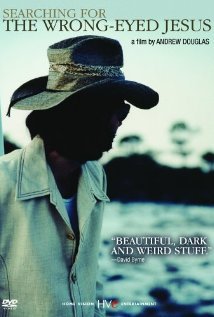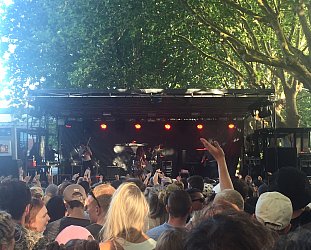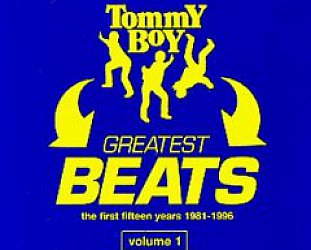Graham Reid | | 2 min read
Jim White: The Wound That Never Heals

Traveling around America's South off the highways and interstates is, as many will tell you, a sometimes frightening experience. Not because of the bad characters -- although there are plenty of those -- but more because of something unspecified.
In his documentary Searching for the Wrong-Eyed Jesus the singer-songwriter Jim White encapsulates this feeling in words which rang with truth when I first heard them.
"Everybody will tell you the South isn't a place, it's a state of mind," he says echoing words I heard many times on my journeys through those strange lands, "but I think it's more than a state of mind.
"The South is an atmosphere."
And in his journeys off the main roads White -- and documentary maker Andrew Douglas -- brings that atmosphere into its contradictory life through encounters with the troubled, the back-sliders, the criminals and the saved. Jesus walks this land as a real presence for many people in way few outsiders can ever understand.
But at night in the swamps when the air is still and Spansih moss hanging from the trees takes strange shapes in the moonlight you can feel that atmosphere of good Vs evil which haunts so many characters in Searching for the Wrong-Eyed Jesus.
These characters tell stories of Christ saving them from methamphetamine and jail, of those troubled souls who stumble between evil and redemption, and of poets and writers who quote Goethe and the Bible with equal certainty.
The music throughout - by White, the Handsome Family and other lesser knowns -- is as haunting as cool Southern nights and are populated by killers, guns, bodies thrown into the bayou and other such horrific events.
It is little wonder in a place where death is ever-present that a woman can start a sentence with "until I got saved" then tell a story of cancer, divorce and the death of a teenage child ("that stops you from believing for a while").
The Rapture when the graves are opened seems as real as to many of these folks as the tattoos on their bodies. The fires of Hell are also literal, they will start on the inside of your body and come out, "just like that".
"The most ordinary conversation in South has a theological basis," says one character in a voice-over. And it most often comes with an oppressive fatalism.
Stories abound, some exaggerated but believed by the teller. The darkness feeds itself and is compounded by death, pessimism, preachers and poverty.
And of all this White -- a Southerner who has come back to search for its essence -- can say without sounding like he's hedging his bets that "it's so wrong that it's right".
If you are going to the South at some point, get off the main roads, stop in bars and be prepared for the strangeness. And don't let this remarkable 2003 documentary -- which might get on your knees prayin' for redemption, or for the weirdness to end -- put you off, as it may.
The South is an atmosphere alright.
Owen Wood describes himself as such an occasional writer that he can't recall much published between '84 and 2004, says he prefers television programmes with real actors rather than reality people, orders real ale over red wine, and promises faithfully to get a Facebook and Twitter account as soon as he thinks of something worth saying. He has no website but does have a large library and "No, I don't like at home with my mother". His previous contributions to Other Voices Other Rooms are here.
Other Voices Other Rooms is an opportunity for Elsewhere readers to contribute their ideas, passions, interests and opinions about whatever takes their fancy. Elsewhere welcomes travel stories, think pieces, essays about readers' research or hobbies etc etc. Nail it in 1000 words of fewer and contact graham.reid@elsewhere.co.nz.
See here for previous contributors' work. It is wide-ranging.





post a comment